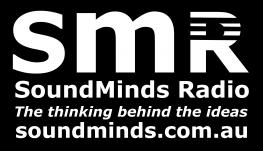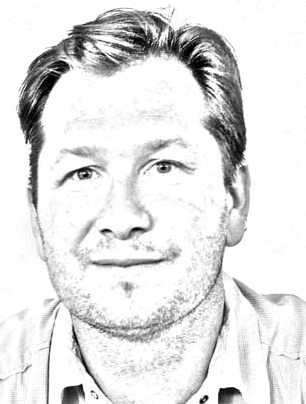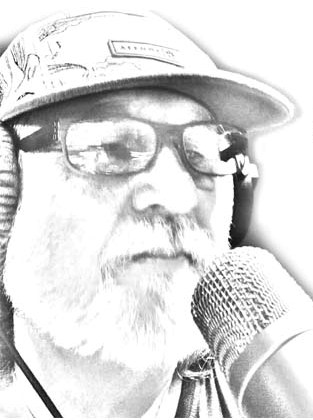
SoundMinds Radio
Ever found yourself sitting next to a carcinologist at a party and within minutes found yourself as excited as they are about lobsters?
Was their research just so interesting, or was their excitement just so palpable?
Coming from BayFM Byron Bay and beginning distribution on the Community Radio Network is a radio/podcast series that sits with experts in their field of study, to present what has them obsessed in their own words. There's more than just lobsters: each edition the project looks at a specific issue in a number of fields including engineering, sociology, media studies and more. Devised by Executive Producers Michael Schubert and Dallas Rogers, SoundMinds Radio seeks to present the research, ideas and trends that comprise contemporary life. Think of it as 'audio food for thought'.
We asked the team about the origins of the project:
First of all, tell me about the team's experience making radio. Is SoundMinds Radio the first project of its kind for the team?
We have different levels of experience with making radio about academic thinking and ideas. Michael is the Broadcast Manager at BayFM, and he has been producing a weekly solo show covering topics from sociology, the sciences and psychology for the last two years. Dallas is a real life academic at Western Sydney University and he’s been using radio documentary and podcasting to communicate his research beyond the academy for a couple of years. He is also a podcast producer for The Conversation.
We meet quite fortuitously. We’ve both completed several Australian Film, Television and Radio School (AFTRS) short courses recently, and in early 2015 we participated in the first AFTRS Diploma of Digital Content Radio online course. Dallas lives in Sydney and Michael in Byron Bay, but we were randomly assigned to the same group for a major radio project. We created five SoundMinds Radio episodes, built a website and got active on social media for the group project. And the SoundMinds Radio project was born.
How would you describe the project and the format - say to a friend-of-a-friend at a dinner party?
Our radio show plays focused 15-minute radio pieces that get you behind the ‘big ideas’ in society. Community radio audiences are diverse and critical listeners who seek content that provides an in-depth look at important issues. This project translates often-dry academic research into entertaining radio stories. We make the ideas easy to understand and the radio experience engaging.
People are interested in the research that is being conducted at universities around the country, but they have limited access to most of the new thinking because it is commonly thought of as ‘un-newsworthy’. We take an insightful look at some of the more fascinating research that goes unreported, and we tell this research story in the researcher’s own voice.
You're covering a topic in 15 minutes from a variety of angles. What do you feel the strengths in covering a topic with such brevity are?
We live in a world of quick communication. Whether you’re reading a tweet or listening to a podcast, the content needs to grab and keep your attention. Psychologists say that the average human attention span, what they call selective sustained attention, is about 5 minutes (wait, there’s probably an episode in that!) Anyway, studies have shown that 15 minutes is about as long as you can hold someone’s sustained attention in a learning setting. And some of our favourite radio documentaries are only a few minutes long. So we decided to combine the storytelling tools of radio documentary with the online teaching tools of universities to guide the production of our show. We found that we can tell a sonically rich research story in 15 minutes, which is about as long as the average listeners’ bus trip to work.
Did you want to simply present ideas differently for audiences, or have a chance to present misunderstood ones?
We just love talking about ideas; especially the ones that make you rethink your place in the world. And we thought that other people would want to hear these ideas too. One of the drivers for this project is that we often hear academics talking about their research ‘findings’, but we don’t hear researchers talk about the ‘ideas’ that sit behind their research findings as much. We think the ideas that sit behind the research are, at times, more fascinating than the research data alone. So we created a radio show to talk about the 'ideas behind the research.'
Are there any radio programs or podcasts that have been particularly influential in the development of the SoundMinds format?
Dallas is a long-time Radio National listener, and tracks his interest in covering social issues on the radio back to the days when Alan Saunders hosted The Philosophers Zone and Geraldine Doogue hosted Life Matters. Alan Saunders was as sharp as a razor and a master communicator of philosophical ideas. Dallas was devastated when he passed away. Dallas is also a connoisseur of long-form radio documentary, but more recently has been captured by the podcast revolution. So to prepare for the first season Dallas listened to every episode of 99% Invisible, starting from the very first episode. Roman Mars might be a mainstream household name these days, but he is still the king of concise storytelling. Dallas thinks the perfect radio host would be a calm-talking hybrid clone of Gwen Macsai and Linda Marigliano.
Michael grew up in regional NSW listening to radio plays and thought that was what he was going to do. He's also a long-time Radio National listener and misses The Philosopher's Zone, but has to admit The Minefield, Radiotonic and Soundproof are now firm favourites. He didn't go into radio, but one of his friends went to 2XX in Canberra and that was his introduction to community radio. The emergence of digital content delivery grabbed his attention and the power of the podcast to create accessible short-form content inspired him to learn more. He loves Radiotopia from PRX, the home of 99% Invisible (although they did lure Julie Shapiro back to the US from RN) and Radiolab for science coverage, as well as This American Life.
Oh, and the recent Audiocraft conference in Sydney was very inspirational, and shows that we are on the verge of a major radio revolution in Australia.
What have been the highlights so far?
We’ve worked hard to get the project up and running, and we’ve been surprised and humbled by the reception to the project from the radio and academic communities. The academic community has really opened its doors to our project, with internationally renowned researchers taking the time to talk with us and to trust us with their story. Receiving funding for the first series of SoundMinds Radio from the Community Broadcasting Foundation (CBF) and being invited to talk about our project at the CBAA Conference was encouraging.
But hearing that our show was going onto the Community Radio Network (CRN) was a really big deal. Equally, being asked to produce a special SoundMinds Radio episode for the London School of Economics, or having an episode showcased on a UK academic podcast site, or having our episodes rebroadcast on one of Australia’s leading alternative media organisations [i.e. The Conversation] has made all the hard work worthwhile.
What future topics will SMR tackle?
Well, it’s hard to say. We let the researchers set the agenda for our stories! But you can expect to hear more SoundMinds Radio ideas that will change the way you think about the world. After all, that's our motto: The Thinking Behind The Ideas. But here is a sneak peek of what is on the SoundMinds Radio production table: what superheroes teach us about geopolitics; and large-scale factory farms and the rural/urban divide.
For CRN subscribers:
- SoundMinds Radio is broadcast/distributed by CRN Thursday from 10:45 to 11:00 EST/EDT and is available for DDN capture
- Program Website
- For more information contact CRN staff on 02 9310 2999 or email [email protected]
Not a CRN subscriber, but want to find out more about getting content like this for your station? Read more here.


Facebook comments